Comics from the Edge
[What an ugly, broken page--and one whose content should by rights be changing far faster than I've been getting around to it. Someday I hope both to fix the technical glitches and to add the slew of new stuff I've found since last I updated here. When I feel I've done that, I suppose this note will go away.]
 And I don't mean the cutting edge, or the bleeding edge, or the Edge, or anything else edgy. I mean "the edge" as in "the edge of the dance floor" or "the edge of the water, one foot hovering nervously." I've never been able to decide how, or whether, I want to relate to comics at all.
And I don't mean the cutting edge, or the bleeding edge, or the Edge, or anything else edgy. I mean "the edge" as in "the edge of the dance floor" or "the edge of the water, one foot hovering nervously." I've never been able to decide how, or whether, I want to relate to comics at all.
 When we were kids, my brother acquired a modest collection of old comics--already old in 1981 or so--that sat around upstairs til my parents finally moved this summer, 2002. (I salvaged one or two of them.) There were two Archie books, I think, and one Richie Rich; one Incredible Hulk collection, one compelling Batman story in six issues, one dark and enthralling issue of the X-Men, and the first fifteen or so issues of Spider-Man in three volumes. Oh, I forget, there were also some DC collections: a collection of magical sports stories, a collection of team-ups involving Superman and the standard rotation of allied heroes, and one collection of villain-origin stories; all stuff from the fifties and sixties, I'd guess. All these, I read so many times I could probably reconstruct their stories and much of their dialogue with fair accuracy.
When we were kids, my brother acquired a modest collection of old comics--already old in 1981 or so--that sat around upstairs til my parents finally moved this summer, 2002. (I salvaged one or two of them.) There were two Archie books, I think, and one Richie Rich; one Incredible Hulk collection, one compelling Batman story in six issues, one dark and enthralling issue of the X-Men, and the first fifteen or so issues of Spider-Man in three volumes. Oh, I forget, there were also some DC collections: a collection of magical sports stories, a collection of team-ups involving Superman and the standard rotation of allied heroes, and one collection of villain-origin stories; all stuff from the fifties and sixties, I'd guess. All these, I read so many times I could probably reconstruct their stories and much of their dialogue with fair accuracy.
 Particularly good were the Batman and X-Men stories. (Particularly bad was the Richie Rich, but I read it many times anyway, because I was like that.) Batman is framed for the murder of the woman he loves, by her father, the wonderfully forbidding Ra's Al Ghul. Fugitive, he must exonerate himself, pursued by the police and also by the Creeper, a wingnut hero previously unknown to me. In this story, for the first time, I got used to hearing Batman described as "the detective," which was an odd departure from the daylit gadget peddler in pajamas I was familiar with. And indeed this Batman was of a decidedly hardboiled stripe, calling criminals "punk," prowling around after clues in strictly nocturnal settings, using plenty of disguises but nary a gadget. (Oh, and virtually no trace of Robin--he phones from his dorm room at college, and Bats tells him to stay there, and that's it for him.) It wasn't a groundbreaking story, it was just better than most, and more to the point its tone was nothing I'd seen in a comic before.
Particularly good were the Batman and X-Men stories. (Particularly bad was the Richie Rich, but I read it many times anyway, because I was like that.) Batman is framed for the murder of the woman he loves, by her father, the wonderfully forbidding Ra's Al Ghul. Fugitive, he must exonerate himself, pursued by the police and also by the Creeper, a wingnut hero previously unknown to me. In this story, for the first time, I got used to hearing Batman described as "the detective," which was an odd departure from the daylit gadget peddler in pajamas I was familiar with. And indeed this Batman was of a decidedly hardboiled stripe, calling criminals "punk," prowling around after clues in strictly nocturnal settings, using plenty of disguises but nary a gadget. (Oh, and virtually no trace of Robin--he phones from his dorm room at college, and Bats tells him to stay there, and that's it for him.) It wasn't a groundbreaking story, it was just better than most, and more to the point its tone was nothing I'd seen in a comic before.
Then, the X-Men. When I finally got around to reading this comic, it rapidly became my favorite, and remained so. It rather hindered my ever liking the X-Men again, in a curious way; there are a great number of X-Men, so that they can never all be featured in the same story, and I sort of imprinted on the arbitrary squad present in this issue. Particularly, I adored Nightcrawler, who had a real starring role, alone for the entire expository preamble of the story; my encounters with the X-Men since then have indicated that overall, Nightcrawler tends to take a humble backseat to more incendiary characters. A dark and brooding Dr. Doom has imprisoned each of a team of X-Men, leaving them to overcome custom-made deathtraps (these are perhaps too common in comics, and his motives are unexplained save for a remark indicating that Doom would like to think of himsel���f as inscrutable). Like Nightcrawler, Angel, Wolverine and Colossus break loose. One by one they work their way through a properly gothic castle to Doom's headquarters, confront him and demand the release of Storm, who promptly bugs right out because her particular imprisonment was so intolerably harsh. The rest of the story concerns their effort to call the transformed Storm back to her normal state of being, with reference to an earlier disaster of just this sort that ultimately killed one of their number (big news in the comics world, where generally no one dies, let alone remains dead).
 Again, the writing was better than what I'd seen before, and the tone was darker, and a little more real. Actually I don't think I mean "real." I mean it was more internal, more psychological. The story was still very much in the fantastic mode, but the characters were explored as people. It's a tiny step from the garish adventure of the older comics toward something like mag���ical realism. How would real people, with their own personal issues, respond to a fantastic world?
Again, the writing was better than what I'd seen before, and the tone was darker, and a little more real. Actually I don't think I mean "real." I mean it was more internal, more psychological. The story was still very much in the fantastic mode, but the characters were explored as people. It's a tiny step from the garish adventure of the older comics toward something like mag���ical realism. How would real people, with their own personal issues, respond to a fantastic world?
 So that was my early exposure to comics. It was followed by a long period of doing oth����tuff, during which I slowly developed a sense of just how much material existed in the comics world that I wasn't aware of. It was tempting, and daunting; I liked comics, I liked some of those characters, and I found it mystifying, on those rare occasions when I browsed comics stores, to find some charact����'d taken a shine to suddenly being drawn in a style twenty or thirty years newer, wearing a new costume and making references to preposterous events that seemed to have happened ages ago. I would have loved even to pick one or two series to follow in earnest, but the volume was too much; it intimidated me. Even then, it was a choice--a conscious decision about what I would and wouldn't invest my time in. I steered clear, reread the old comics I already had around, and decided that was enough. I did buy one comic off the stand in a drugstore, once, which was a bit of a thrill--that was the first issue of Marvel's Secret Wars. Eventually got round to reading the rest; it was fun, but certainly an exercise in more-cosmic-than-thou (which I'm told gets far worse elsewhere).
So that was my early exposure to comics. It was followed by a long period of doing oth����tuff, during which I slowly developed a sense of just how much material existed in the comics world that I wasn't aware of. It was tempting, and daunting; I liked comics, I liked some of those characters, and I found it mystifying, on those rare occasions when I browsed comics stores, to find some charact����'d taken a shine to suddenly being drawn in a style twenty or thirty years newer, wearing a new costume and making references to preposterous events that seemed to have happened ages ago. I would have loved even to pick one or two series to follow in earnest, but the volume was too much; it intimidated me. Even then, it was a choice--a conscious decision about what I would and wouldn't invest my time in. I steered clear, reread the old comics I already had around, and decided that was enough. I did buy one comic off the stand in a drugstore, once, which was a bit of a thrill--that was the first issue of Marvel's Secret Wars. Eventually got round to reading the rest; it was fun, but certainly an exercise in more-cosmic-than-thou (which I'm told gets far worse elsewhere).
Eventually my brother got hold of Watchmen, and that was a floodgate: a serious effort to reconcile the fantastic conceit of superheroes with a realistic world, and an example much followed since its appearance. I was absorbed, and later I tore through the first three Mage books, and Dark Knight Returns followed by Batman: Year One, and so on Batman: the Cult, and at some point the beginning of ElfQuest (years after it was the new thing, that), and pretty recently Kingdom Come. And at long last, only a few months ago, I finally got around to reading some Sandman, which I'd been hearing about ad infinitum for ten years.
 In a counterpoint, I suppose I should not that I did read "strip" comics this whole time--pretty much whatever was in the paper. Every time I came home from college I forced my dad to update me on the doings of Prince Valiant since my last visit. So I haven't exactly been isolated from comics as a form or anything. But I'm thinking of comics the cultural phenomenon as well as comics the form, here; pictorial sequences are used for instructional manuals all the time, for instance, but I'm talking about narrative comics, things geeks go buy in comic-book stores. You know what I mean.
In a counterpoint, I suppose I should not that I did read "strip" comics this whole time--pretty much whatever was in the paper. Every time I came home from college I forced my dad to update me on the doings of Prince Valiant since my last visit. So I haven't exactly been isolated from comics as a form or anything. But I'm thinking of comics the cultural phenomenon as well as comics the form, here; pictorial sequences are used for instructional manuals all the time, for instance, but I'm talking about narrative comics, things geeks go buy in comic-book stores. You know what I mean.
 I never did settle down and read anything of the monthly variety, but I enjoyed the long form. There wasn't nearly so much commitment involved. There was a foreseeable end to the story arc. Comic periodicals, like soap operas and any other show that runs too long, tend to develop progressively more outlandish plots until they're simply farcical. Graphic novels are susceptible to sequels--I und���erstand Mage has some now--but at least they've got a better shot at holding their focus. I enjoy them, I'm plotting to get a hold of Maus one of these days, I'm generally relaxing into thinking of books in comic form as books, pretty much.
I never did settle down and read anything of the monthly variety, but I enjoyed the long form. There wasn't nearly so much commitment involved. There was a foreseeable end to the story arc. Comic periodicals, like soap operas and any other show that runs too long, tend to develop progressively more outlandish plots until they're simply farcical. Graphic novels are susceptible to sequels--I und���erstand Mage has some now--but at least they've got a better shot at holding their focus. I enjoy them, I'm plotting to get a hold of Maus one of these days, I'm generally relaxing into thinking of books in comic form as books, pretty much.
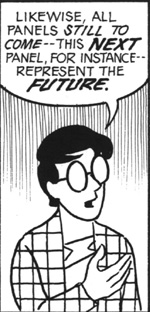 Enter, two years ago, Brendan Milburn. During the year I was privileged to work with Brendan on a silly old website he urged me, nay commanded me to read Understanding Comics by Scott McCloud. If you haven't read UC, you should. It's a comprehensive scholarly treatise on comics, itself in comics form. McCloud has a subtle and perceptive mind, and he's got the instincts of a teacher. The book was written in comics form in part to make a point, that comics make a powerful vehicle for more than superhero fiction. But I suspect it was just as much because comics allowed complex theses to be advanced compactly and memorably. A picture really is worth a thousand words. Or so.
Enter, two years ago, Brendan Milburn. During the year I was privileged to work with Brendan on a silly old website he urged me, nay commanded me to read Understanding Comics by Scott McCloud. If you haven't read UC, you should. It's a comprehensive scholarly treatise on comics, itself in comics form. McCloud has a subtle and perceptive mind, and he's got the instincts of a teacher. The book was written in comics form in part to make a point, that comics make a powerful vehicle for more than superhero fiction. But I suspect it was just as much because comics allowed complex theses to be advanced compactly and memorably. A picture really is worth a thousand words. Or so.
Exposure to all that high-minded thinking about comics made for a couple of changes. First, a little nose-following has led me to find a lot of great comics material online, mostly using McCloud's own site as beachhead. From his own online work to his recommendations and beyond, I've been taking baby steps into what looks increasingly like an infinite supply of comics living online. Some months ago I signed on to the quietly groundbreaking Modern Tales, a bundled subscription to an array of comics by different artists, which provides me with a little new content that I like every day, for cheap, while (with luck) turning a profit for the artists.
 Now, I'm not diving into comics headfirst just because I can find them online now. There's still too much to keep track of, and I'm not prepared to try. But there is a difference; I read a lot more of them than I used to, certainly. There's a lot out there. Maybe it seems safer to read some because I always know they're archived somewhere I can find them, rather than periodically released into the world in fragile little paper packets that disappear soon after they're printed.
Now, I'm not diving into comics headfirst just because I can find them online now. There's still too much to keep track of, and I'm not prepared to try. But there is a difference; I read a lot more of them than I used to, certainly. There's a lot out there. Maybe it seems safer to read some because I always know they're archived somewhere I can find them, rather than periodically released into the world in fragile little paper packets that disappear soon after they're printed.
The other thing that's changed since reading UC is that I have subtly begun to daydream about creating comics myself. (I think. Is that really true, that I hadn't thought of the comics medium before? I think so...)
My first thought along these lines was nothing to please McCloud. I thought, hey, y���eah-I could take all those not-so-good ideas I can't get out of my head and tie them together into an enormous comic book! And so I cobbled together an idea for an epic story about paramilitary rock stars, a college grad from Connecticut and his psychic sidekick, a ghost from the Reign of Terror and his soul-singing descendant, a stray dog, a cat-burgling gorilla and a king from ancient Greece. In the name of honesty I should make clear that I still really like the story. But long about the time it developed that my villains were probably going to be sorcerers from an undiscovered civilization of Neanderthals, I realized that I had to be stopped.
But then I got to thinking about a nutty old novel idea from high school, and how it might be resurrected in a shorter form (and comics always seems to be short, no matter how visually dense). Could that be a way to salvage (or just get myself back into) ideas I've let go but still miss? Putting them in another form? More recently, a sketch that I'd originally imagined as a TV show has started to look like a likely comics project. Having the power of visual cues seems interestingly more specific and more conducive to ambiguity at the same time. It's appealing. I'm definitely interested in trying it by now.
I don't think I'm likely to attempt drawing things any time soon. I have never been an artist, end statement. I like the idea of becoming one, but I don't feel like I have a whole lot to work with and I'm not sure I would really invest the kind of time it would probably take to get anywhere from where I am. But I suppose we'll see. I could always decide that total artistic control outweighs artistic quality (not that it sounds very convincing on the face of it).
If you're expecting a meaningful conclusion to this particular ramble--well, nuh-uh. But I'll end with a bunch of comics I like, electric and print. Since much of what I mant to do all along with this essay was plug them.
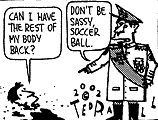
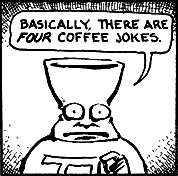
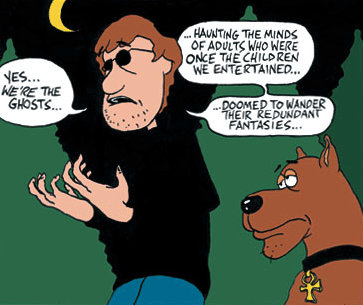
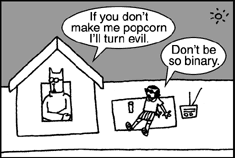
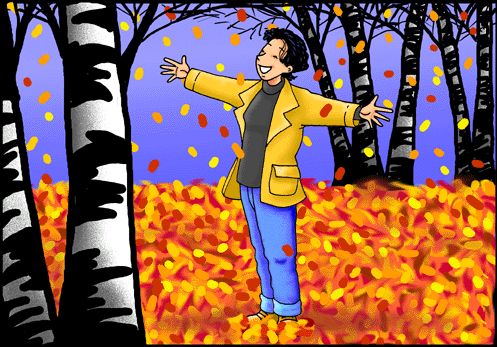

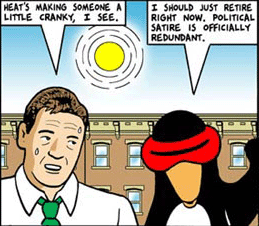
From here down they're all part of the Modern Tales package. 
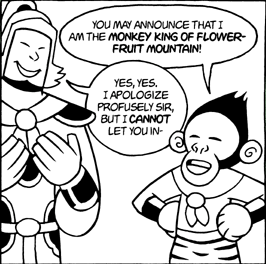
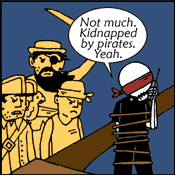
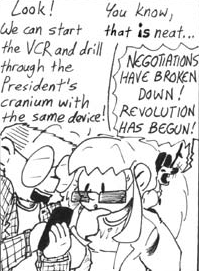
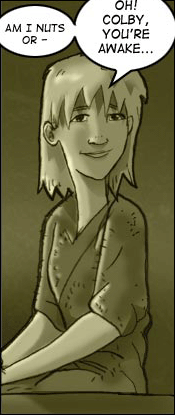
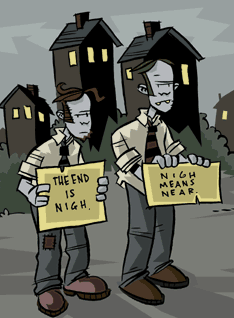
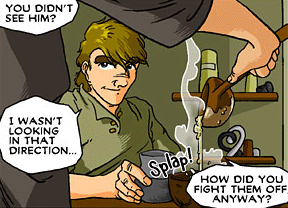
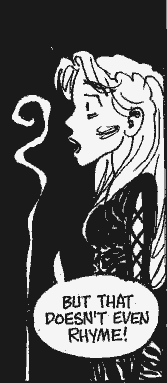
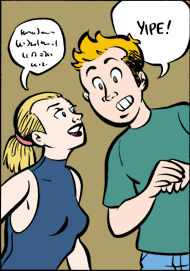
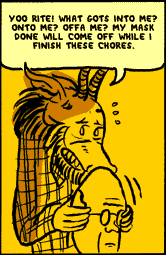
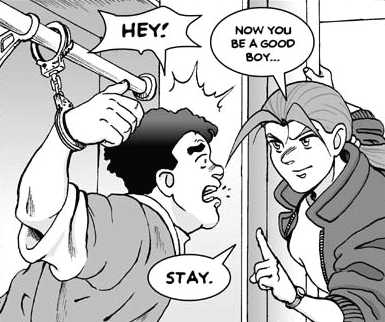
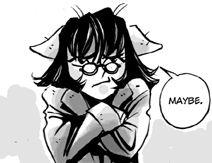
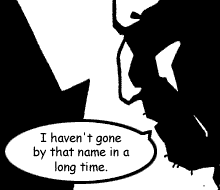
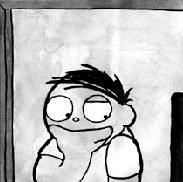
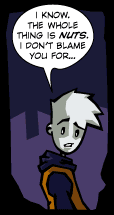
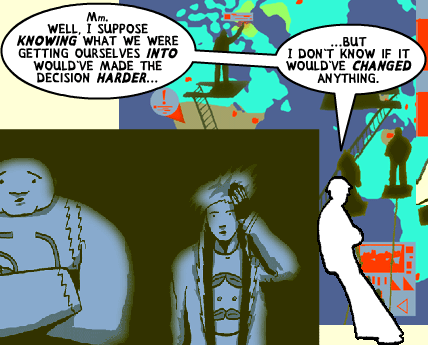


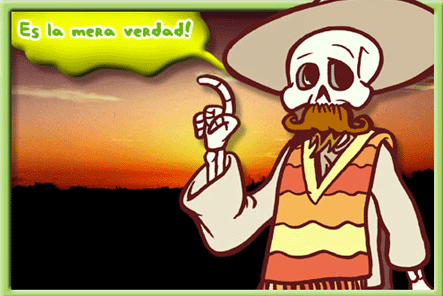
I realize some of this might raise copyright issues, in theory. I should hope nothing too terrible; everything's properly attributed, everything's fragmentary, and it all amounts to free advertisement. But if somebody affiliated with one of the referenced works doesn't like it, well, by all means and I'll do whatever I have to do to work it out.
This is by no means a complete list; I suppose I'll add things from time to time.
personal
index
 And I don't mean the cutting edge, or the bleeding edge, or the Edge, or anything else edgy. I mean "the edge" as in "the edge of the dance floor" or "the edge of the water, one foot hovering nervously." I've never been able to decide how, or whether, I want to relate to comics at all.
And I don't mean the cutting edge, or the bleeding edge, or the Edge, or anything else edgy. I mean "the edge" as in "the edge of the dance floor" or "the edge of the water, one foot hovering nervously." I've never been able to decide how, or whether, I want to relate to comics at all.
































